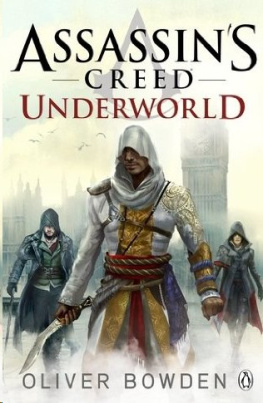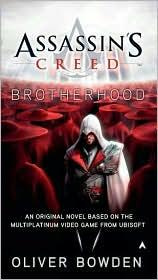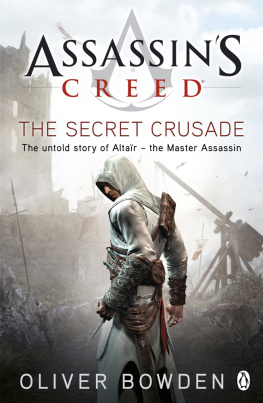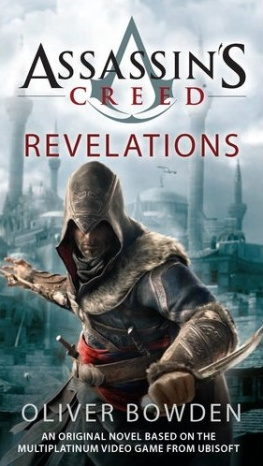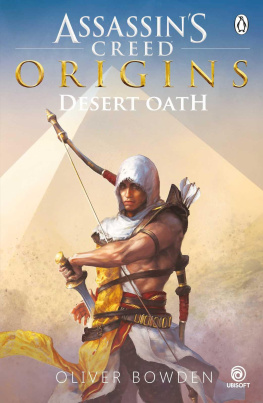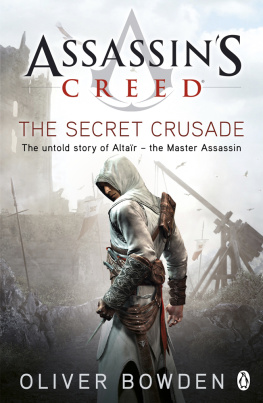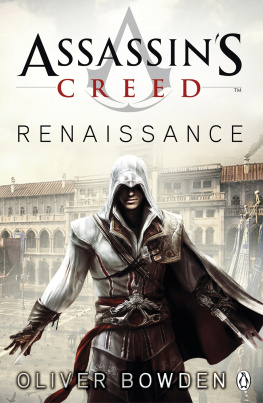Oliver Bowden
ASSASSINS CREED
Underworld
Contents
Also in the Assassins Creed series
Renaissance
Brotherhood
The Secret Crusade
Revelations
Forsaken
Black Flag
Unity
Part One
GHOST TOWN
1
The Assassin Ethan Frye was leaning on a crate inthe shadows of Covent Garden Market, almost hidden by the tradesmens carts. His arms werefolded across his chest, chin supported in one hand, the soft, voluminous cowl of his robescovering his head. And as the afternoon dwindled into evening he stood, silent and still.Watching. And waiting.
It was rare for an Assassin to rest his chin onhis leading hand like that. Especially if he was wearing his hidden blade, which Ethan was, thepoint of it less than an inch from the exposed flesh of his throat. Closer to his elbow was alight but very powerful spring mechanism designed to deploy the razor-sharp steel; the correctflick of his wrist and it would activate. In a very real sense, Ethan was holding himself atknifepoint.
And why would he do this? After all, evenAssassins were not immune to accidents or equipment malfunction. For safetys sake the menand women of the Brotherhood tended to keep their blade hands clear of the face. Better thatthan risk ignominy or worse.
Ethan, however, was different. Not only was hepractised in the art of counter-intelligence and resting his chin on his strongest armwas an act of deception designed to fool a potential enemy but he also took a darkdelight in courting danger.
And so he sat, with his chinin his hand, watching, and waiting.
Ah, he thought, what is this?He straightened and shook the rest from his muscles as he peered through the crates into themarket. Traders were packing up. And something else was happening too. The game was afoot.
2
In an alleyway not far from Ethan lurked a fellowby the name of Boot. He wore a tattered shooting jacket and a broken hat, and he was studying apocket watch lifted from a gentleman not moments ago.
What Boot didnt know about his newacquisition was that its erstwhile owner had intended to take it to the menders that very day,for reasons that were shortly to have a profound effect on the lives of Ethan Frye, Boot, ayoung man who called himself The Ghost and others involved in the eternal struggle between theTemplar Order and the Assassin Brotherhood. What Boot didnt know was that the pocketwatch was almost exactly an hour slow.
Oblivious to that fact, Boot snapped it shut,thinking himself quite the dandy. Next he eased himself out of the alleyway, looked left andright and then made his way into the dying day of the market. As he walked, his shouldershunched and his hands in his pockets, he glanced over his shoulder to check he wasntbeing followed and, satisfied, continued forward, leaving Covent Garden behind and entering theSt Giles Rookery slum.
The change in the air was almost immediate. Wherebefore his boot heels had rung on the cobbles, now they sank into the ordure of the street,disturbing a stink of rotting vegetable and human waste. The pavements werethick with it, the air reeking. Boot pulled his scarf over his mouth and nose to keep out theworst of it.
A wolfish-looking dog trotted at his heel for afew paces, ribs visible at its shrunken belly. It appealed to him with hungry, red-rimmed eyesbut he kicked it away and it skittered then shrank off. Not far away, a woman sat in a doorwaywearing the remnants of clothes tied together with string, a baby held to her breast as shewatched him with glazed dead eyes, rookery eyes. She might be the mother of a prostitute,waiting for her daughter to come home with the proceeds and woe betide the girl if she returnedempty-handed. Or she might command a team of thieves and blaggers, soon to appear with thedays takings. Or perhaps she ran night lodgings. Here in the rookery the once-grandhouses had been converted to flats and tenements, and by night they provided refuge for those inneed of shelter: fugitives and families, whores, traders and labourers anyone who paidtheir footing in return for space on a floor and who got a bed if they were lucky and had themoney, but most likely had to make do with straw or wood shavings for a mattress. Not that theywere likely to sleep very soundly anyway: every inch of floor space was taken, and the cries ofbabies tore through the night.
And while many of these people were unfit orunwilling to work, many more had occupations. They were dog-breakers and bird dealers. They soldwatercress, onions, sprat or herring. They were costermongers, street sweepers, coffee dealers,bill stickers and placard carriers. Their wares came into the lodgings with them, adding to theovercrowding, to the stench. At night the houses would be closed, brokenwindows stuffed with rags or newspaper, sealed against the noxious atmosphere of the night, whenthe city coughed smoke into the air. The night air had been known to suffocate entire families.Or so was the rumour. And one thing that spread about the slums more quickly than disease wasrumour. So as far as the slum dwellers were concerned, Florence Nightingale could preach as muchas she liked. They were going to sleep with the windows sealed.
You could hardly blame them, thought Boot. If youlived in the slum your chances of dying were great. Disease and violence were rife here.Children risked being suffocated when adults rolled over in their sleep. Cause of death:overlaying. It was more common at weekends when the last of the gin had been drunk and thepublic houses emptied, and Mother and Father felt their way home in the soupy fog, up the slickstone steps, through the door and into the warm, stinking room where they at last laid downtheir heads to rest
And in the morning, with the sun up but the smogyet to clear, the rookery would ring to the screams of the bereaved.
Deeper into the slum went Boot, where tallbuildings crowded out even the meagre light of the moon, and fog-bound lanterns glowedmalevolently in the dark. He could hear raucous singing from a public house a few streets along.Every now and then the singing would grow louder as the door was thrown open to eject drunkardson to the street.
There were no pubs on this street, though. Justdoors and windows wadded with newspaper, washing hanging from lines overhead,sheets of it like the sails of a ship, and, apart from the distant singing, just the sound ofrunning water and his own breathing. Just him alone.
Or so he thought.
And now even the distant singing stopped. Theonly sound was dripping water.
A scuttling sound made him jump.Whos that? he demanded, but knew immediately it was a rat, and it was apretty thing when you were so scared you were jumping at the sound of a rat. A pretty thingindeed.
But then it came again. He whirled and thick airdanced and eddied around him, and it seemed to part like curtains and for a moment he thought hesaw something. A suggestion of something. A figure in the mist.
Next he thought he heard breathing. His own wasshort and shallow, gasping almost, but this was loud and steady and coming from where?One second it seemed to be ahead of him, the next from behind. The scuttling came again. A bangstartled him, but it came from one of the tenements above. A couple began arguing he hadcome home drunk again. No,

